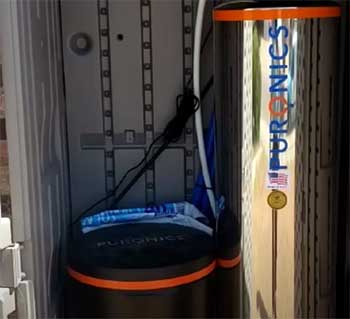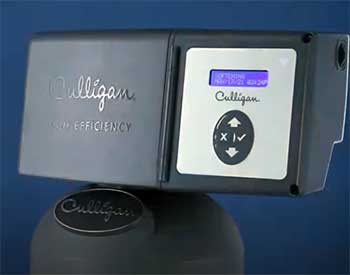In the world of home water treatment, two giants reign supreme – Puronics and Culligan. Each has earned an exceptional reputation, but as the saying goes, “The devil is in the details.”
With this comprehensive review, we’ll dive into those details to bring you an in-depth comparison of these two water softener behemoths.
A Brief Comparison Table
| Aspects | Puronics | Culligan |
| Origin | California, USA | Illinois, USA |
| Age | 70+ years | 100+ years |
| Unique Feature | SilverShield® HYgene® technology for bacterial inhibition | Wide range of customizable products |
| Product Range | Five water softener systems | Extensive array of water treatment solutions |
| Pricing | Generally more affordable | Generally more expensive |
| Warranty | Comprehensive lifetime warranty on many models | Warranties vary, generally not as comprehensive |
| Installation | Requires professional installation | Requires professional installation |
| Availability | Limited, especially in certain rural areas | Broad, with global presence |
| Included Services | Basic product consultation | In-home water testing and consultation |
About Puronics
Puronics is a California-based company with a history stretching back over 70 years. Their water softeners are recognized for efficiency and longevity. All Puronics products are assembled in the United States, with a robust portfolio including five water softener systems, each with unique advantages.
About Culligan
Culligan, on the other hand, is a company that originated in Illinois. With almost 100 years in business, Culligan is a global water treatment powerhouse, providing a broad range of products for various water issues.
The Pros and Cons of Puronics

Pros:
- Puronics systems come with a comprehensive lifetime warranty, a testament to their confidence in the products’ durability.
- All Puronics products utilize NASA-developed SilverShield® HYgene® to inhibit bacteria growth within the system.
- Puronics provides various options to cater to different household needs and budgets, with systems designed for well and city water.
Cons:
- While efficient, Puronics water softeners require professional installation, which may add to the overall cost.
- The availability of Puronics systems can be limited, particularly in certain rural areas.
The Pros and Cons of Culligan
Pros:
- Culligan offers a wide array of products, allowing for highly customized water treatment solutions.
- The company provides in-home water tests, helping homeowners understand their specific water treatment needs.
- Culligan water softeners are typically known for their high-quality softening capabilities.
Cons:
- Culligan’s products often command a higher price point compared to competitors, which can be a barrier for budget-conscious customers.
- Despite the premium pricing, Culligan’s warranties are not as extensive as Puronics’.
Key Differences Between Puronics and Culligan Water Softeners
- Technology and Features
Puronics utilizes cutting-edge technology in their water softeners. All their products feature the SilverShield® HYgene® filter, which harnesses technology developed by NASA. This component is antibacterial, ensuring your water isn’t just softened, but also free from bacteria.
On the other hand, Culligan does not provide any antibacterial feature in their water softeners. Their focus is more on customizability, with a wide variety of models designed to handle different types and levels of water hardness.
- Pricing
Price is another crucial difference between Puronics and Culligan. Puronics generally offers more affordable products compared to Culligan. The latter’s systems tend to be higher-priced, reflecting their global reputation and the breadth of their product range.
That said, Culligan often includes additional services, such as in-home water testing, which may add value despite the higher price.
- Warranty
The companies’ warranties are also starkly different. Puronics offers a comprehensive lifetime warranty on many of its products, reflecting their confidence in their systems’ durability and long-term performance.
Conversely, Culligan’s warranties aren’t as comprehensive, which can be a point of consideration for potential buyers, particularly given the higher pricing of Culligan systems.
- Availability and Installation

In terms of availability and installation, Culligan has a broader reach with dealers and services available in more locations, both urban and rural.
They provide professional installation as part of their service.
Puronics, while also requiring professional installation, might be harder to access in certain areas, especially rural ones.
Both Puronics and Culligan have their strengths and weaknesses. When choosing between the two, you should consider your specific needs, the level of service you desire, and your budget.
While both Puronics and Culligan offer high-quality water softeners, there are a few notable differences. For instance, Puronics’ use of SilverShield® HYgene® technology is unique, providing an added level of sanitation by eliminating bacteria within the system.
Conversely, Culligan’s range is more expansive, offering more flexibility for customers to choose a system that perfectly fits their water needs.
When it comes to cost, Puronics systems tend to be more affordable upfront but require professional installation. Culligan water softeners, while pricier, come with free in-home water testing, a value-added service that can help homeowners better understand their water treatment requirements.
Frequently Asked Questions (FAQ)
While many brands offer reliable water softeners, Puronics and Culligan consistently receive positive reviews for their systems’ longevity and efficiency.
Culligan’s broad product range allows for a highly customized water treatment solution tailored to your specific water issues, making their systems highly effective. However, what makes the water “better” will ultimately depend on your unique water needs.
Culligan water softeners often command a higher price due to the brand’s reputation, quality of products, and the wide range of services included, like in-home water testing.
Puronics systems are assembled in the United States, specifically in Livermore, California.
In Conclusion
Choosing between Puronics and Culligan for your water softening needs ultimately comes down to your specific requirements and budget. Both offer quality products but differ in their approach.
Remember, the right water softener for you will adequately address your home’s specific water issues while fitting comfortably within your budget. Whether you choose Puronics or Culligan, you’re taking a significant step towards better water quality in your home.
